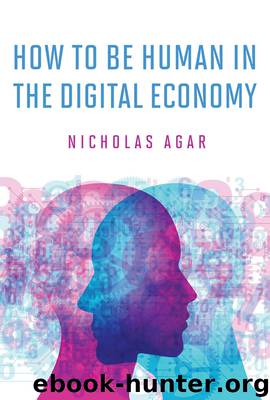How to Be Human in the Digital Economy by Nicholas Agar

Author:Nicholas Agar
Language: eng
Format: epub
Tags: Digital Revolution; social economy; digital economy; social-digital economy; mind work; efficiency; humanness; long view; pro-human bias
Publisher: The MIT Press
A Conjecture about the Labor Market of the Digital Age
The threat to the work norm from the digital package is sharpened when we give it some economic context. Suppose that humans follow Autor’s advice and seek to turn ourselves into digital economy O-rings. We will attempt to justify high rates of pay by pointing to the great importance of our contributions. These efforts could work in the short term. However, the long view exposes this strategy as self-defeating. What’s essential to the economy is the O-ring role—if these O-rings are truly essential then Digital Age economies without them will crash or explode. But this reasoning says nothing about who or what fills that role. The human worker in a Digital Age production chain should understand that the better she does, the stronger the economic incentive to design the digital machine that will fully or partially replace her. The human mind workers remaining in the production chains of the Digital Age should feel like hunted foxes, fleeing from temporary refuge to temporary refuge just ahead of the pursuing hounds. The economic argument against human work suggests that refuges will be temporary. The only way to feel truly safe is to convince those finding new applications for the digital package that the economic value of what you do for your living is negligible.
Earlier we saw Autor and Dorn’s explanation for the polarization of the Digital Revolution workforce. They explain this by pointing to the differential impacts of automation. Jobs at the top and bottom are in general harder to automate than are jobs in the middle. I suggested that good explanations of the present will fail to predict the future if conditions change. We should expect reorganization of workplaces to make jobs at the bottom easier to automate. The creativity and insight celebrated by business biographies must be judged against the pattern-finding prowess of future machine learners. The same digital superintelligence that we could unleash on cancer will predictably be directed at the challenges of business.
I conjecture that the polarization that Autor and Dorn present as a feature of today’s labor market will characterize the labor market of the future, but for purely economic reasons. The worst remunerated jobs will last longest simply because those who fill them will work for less. Hotel workers are poorly paid. If they were paid at the same rate as accountants, we might expect to see an increase in the pressure on their jobs from automation. Automation is characterized by steep one-off costs associated with introducing the systems that will do the work of human workers, followed by much lower costs of maintaining and occasionally updating the machines. It differs from the high ongoing costs of paying for human employees who expect periodic pay rises. The strategy of working for less reduces these ongoing costs. Poorly paid human workers should last longer in the workforce before improvements in automation make the economic case for replacing them irresistible. Accountants go before hotel workers, but eventually even the poorly paid can no longer compete on price.
Download
This site does not store any files on its server. We only index and link to content provided by other sites. Please contact the content providers to delete copyright contents if any and email us, we'll remove relevant links or contents immediately.
| Computer Vision & Pattern Recognition | Expert Systems |
| Intelligence & Semantics | Machine Theory |
| Natural Language Processing | Neural Networks |
Algorithms of the Intelligent Web by Haralambos Marmanis;Dmitry Babenko(18333)
Jquery UI in Action : Master the concepts Of Jquery UI: A Step By Step Approach by ANMOL GOYAL(10487)
Test-Driven Development with Java by Alan Mellor(7768)
Data Augmentation with Python by Duc Haba(7637)
Principles of Data Fabric by Sonia Mezzetta(7406)
Learn Blender Simulations the Right Way by Stephen Pearson(7319)
Microservices with Spring Boot 3 and Spring Cloud by Magnus Larsson(7161)
Hadoop in Practice by Alex Holmes(6752)
RPA Solution Architect's Handbook by Sachin Sahgal(6538)
The Infinite Retina by Robert Scoble Irena Cronin(6249)
Big Data Analysis with Python by Ivan Marin(5970)
Life 3.0: Being Human in the Age of Artificial Intelligence by Tegmark Max(5555)
Pretrain Vision and Large Language Models in Python by Emily Webber(4927)
Infrastructure as Code for Beginners by Russ McKendrick(4679)
Functional Programming in JavaScript by Mantyla Dan(4560)
WordPress Plugin Development Cookbook by Yannick Lefebvre(4422)
The Age of Surveillance Capitalism by Shoshana Zuboff(4291)
Embracing Microservices Design by Ovais Mehboob Ahmed Khan Nabil Siddiqui and Timothy Oleson(4179)
Applied Machine Learning for Healthcare and Life Sciences Using AWS by Ujjwal Ratan(4159)
